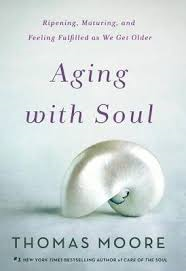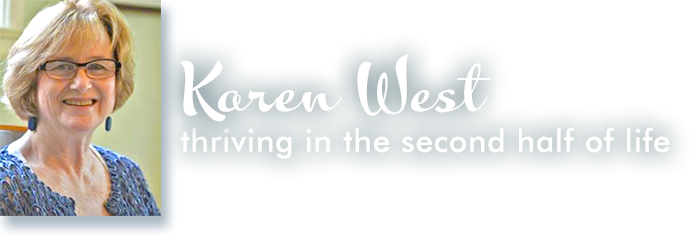(This is my seventh blog entry. I wrote the first four as an introduction to “conscious aging” and “sage-ing,” so if you are new to the topic, I suggest you read the first four entries in order.)
When Certified Sage-ing Leaders (with Sage-ing International) facilitate a workshop, they begin by having the participants introduce themselves by saying their names and the number of “years of life experience” they have. Usually there will be at least one person who chooses instead to say how many years “young” they are. Why do they do that?
In conversation, I often refer to myself as “old,” and when I do, all too often the person I am talking to will say, “You’re not old.” And when I insist that I am old, they try to convince me that I shouldn’t say that; it feels like they think that I’ve just said something that indicates that I have low self-esteem, and they want me to think better of myself.
 I can’t count the number of times I’ve been told I “look great for my age,” I couldn’t possibly be 71. I’ve had my consciousness raised for several years, and I feel guilty about it, but every time this happens, it still makes me feel good. However, these days I rarely just say the expected “Thank you.” I usually say something like “I do look like I’m 71, but 71 today isn’t what 71 was twenty years ago.” When I say this, I often see a light bulb go off as if this were the first time that the person I’m speaking to realized how the aging continuüm has changed. As I said in my first blog entry, there is a whole new life stage, which many people call the “second half of life,” between when we are middle-aged and when we are very old. Some people refer to people in this stage of life as the “young-old” as opposed to the” old-old”.
I can’t count the number of times I’ve been told I “look great for my age,” I couldn’t possibly be 71. I’ve had my consciousness raised for several years, and I feel guilty about it, but every time this happens, it still makes me feel good. However, these days I rarely just say the expected “Thank you.” I usually say something like “I do look like I’m 71, but 71 today isn’t what 71 was twenty years ago.” When I say this, I often see a light bulb go off as if this were the first time that the person I’m speaking to realized how the aging continuüm has changed. As I said in my first blog entry, there is a whole new life stage, which many people call the “second half of life,” between when we are middle-aged and when we are very old. Some people refer to people in this stage of life as the “young-old” as opposed to the” old-old”.
But the problem with the term “young-old” is that it still seems like an attempt of older people to hold on to the identifier “young.” At this point I would like to digress and say a little about the problem of language and aging. “Senior” is definitely no longer acceptable to most older people. The noun most commonly used today is “elder”—this is the term that Sage-ing International uses—but many people are uncomfortable with that term also. Probably because we’ve seen that term used by some cultures, such as the indigenous, as a term of respect, and we aren’t comfortable conferring that kind of respect on someone–especially on ourselves–just because we’ve been alive for a long time.
There are several people who are writing about this population who have tried using different terms. Ashton Applewhite, who wrote This Chair Rocks: A Manifesto Against Ageism, suggests we use “olders” and “youngers”, because these terms are “clear and value-neutral,” and they “emphasize that age is a continuüm There is no old/young divide. We’re always older than some people and younger than others.” Applewhite suggests that “since no one on the planet is getting any younger, let’s stop using ‘aging’ as a pejorative.” (11)
 In his latest book Ageless Soul: The Lifelong Journey Toward Meaning and Joy (2017), Thomas Moore does exactly what Applewhite suggested. He doesn’t just change the term we use to refer to ourselves as we age, he goes deeper and changes the meaning of the verb “to age.” He contrasts it with the verb “to grow old.” Unfortunately, most people just passively “grow old,” but some people “age.” On P. 3 he says, “Aging is an activity. It is something you do, not something that happens. When you age—active verb—you are proactive. If you really age, you become a better person. If you simply grow old, passively, you get worse. Chances are, you will be unhappy as you continue the fruitless fight against time.” He also says, “When I use the word aging, I mean becoming more and more of a person and more you over time.” (5) So instead of just “growing old,” you can choose to “age.” I will return to this concept of “becoming more you” when we delve into one of my favorite topics– life review– in a later blog entry.
In his latest book Ageless Soul: The Lifelong Journey Toward Meaning and Joy (2017), Thomas Moore does exactly what Applewhite suggested. He doesn’t just change the term we use to refer to ourselves as we age, he goes deeper and changes the meaning of the verb “to age.” He contrasts it with the verb “to grow old.” Unfortunately, most people just passively “grow old,” but some people “age.” On P. 3 he says, “Aging is an activity. It is something you do, not something that happens. When you age—active verb—you are proactive. If you really age, you become a better person. If you simply grow old, passively, you get worse. Chances are, you will be unhappy as you continue the fruitless fight against time.” He also says, “When I use the word aging, I mean becoming more and more of a person and more you over time.” (5) So instead of just “growing old,” you can choose to “age.” I will return to this concept of “becoming more you” when we delve into one of my favorite topics– life review– in a later blog entry.
But to return to our original topic. Why do we so often want to avoid calling ourselves “old”—or even in the case of those people who don’t want to see me as “old”? Geriatrician Robert Butler coined the term that is at play here in 1969: “ageism,” which Applewhite calls “the last socially sanctioned prejudice.” (10). I hope you’ll read my next blog entry to learn more about ageism.
To contact me, call me at 651–399-9571 or email me at “karenw0214@gmail.com.” I would love it if you would take a minute to let me know how you feel about my blog.


2 thoughts on ““You look great for your age””
You’re right on track with these remarks, Karen. I always cringe when I hear people make any comment that includes “for your age.” I also cringe when people talk about how “young” they feel. The implication is that young is good, old is not. Kudos for your contributions to shift the paradigm past ageist stereotyping.
Thank you, Pat. I think we need to use another word such as “vital” instead of “young.” We need to pay we pay more attention to the impact of the words we choose to talk about aging.